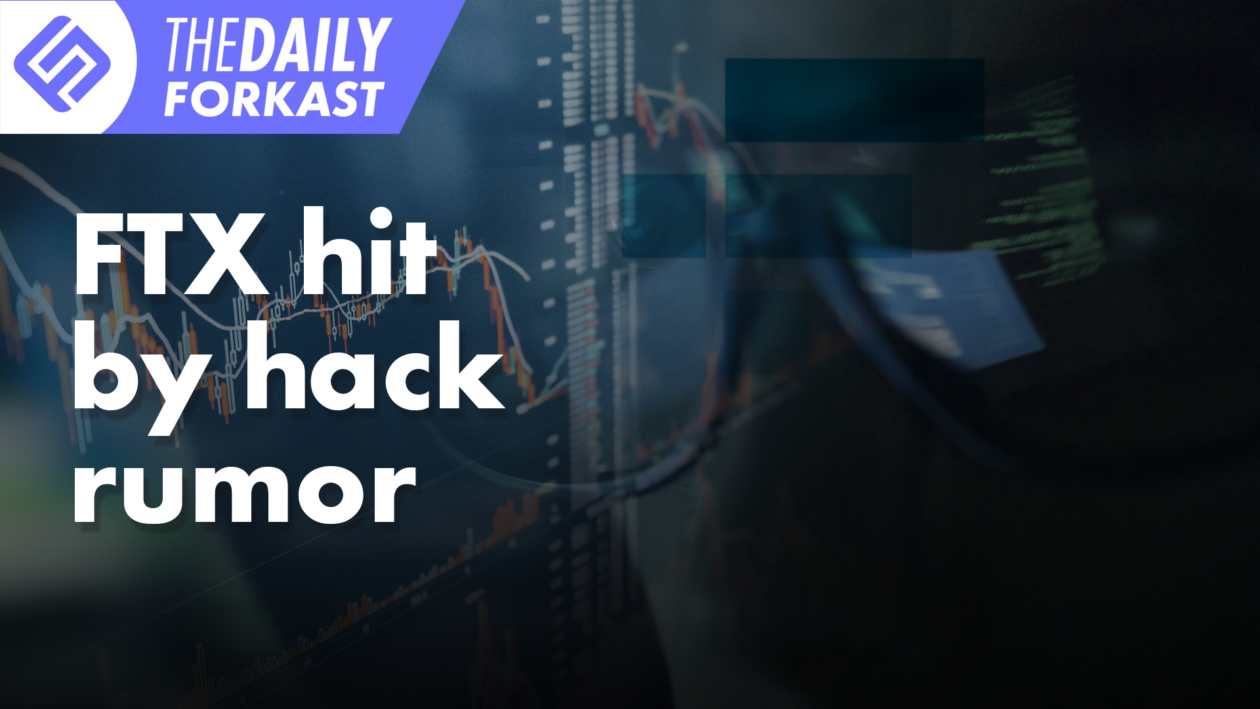FTX, Animoca Brands and Litecoin hit by fake news and scams.
Korea issues updated crypto exchange death note.
China NFT backlash grows.
We’ll have more on those stories — and other news shaping the cryptocurrency and blockchain world — in this episode of The Daily Forkast, September 14th.
Transcript
Welcome to The Daily Forkast, September 14th, 2021. I’m Justin Solomon of Forkast.News, covering all things blockchain, filling in for Editor-in-Chief Angie Lau.
Scams and hoaxes are always a worry for investors, and we’ve got plenty to investigate today include rumours of a hack at Hong Kong based crypto exchange FTX, a scam alert over fraudulent tokens from Animoca Brands, and a fake news release suggesting Walmart would accept Litecoin.
We’ll sort the truth from the fiction. All that and more coming up.
Let’s get you up to speed from Asia to the world.
First up, they say bad news comes in threes. Well, that now seems to apply to fake news as well. The wash of misinformation hitting the crypto industry has affected Hong Kong’s Animoca Brands and FTX, as well as U.S. retail giant Wal-Mart.
Forkast.News Lachlan Keller reports
A few days ago, rumors began circulating that FTX may have been hacked, with a total of over 45,000 bitcoin, worth more than US$2 billion being moved out of FTX’s wallet across hundreds of transactions.
CEO Sam Bankman-Fried addressed concerns via Twitter, explaining how as part of bitcoin withdrawal processing, unspent transaction outputs or UTxOs, were consolidated into a single wallet to speed up processing.
It’s not the first time other UTxOs have been an issue of late. The first DApp on Alonzo testnet Minswap was forced to shut down as it was unable to support multiple users at the same time, something that critics blamed on the use of UTxOs.
Larry Cermak, director of research at The Block, dismissed the rumor as fake, saying his source was FTX’s employees.
Meanwhile, blockchain gaming firm Animoca Brands has been hit by a scam. It issued a warning over an ERC-20 token on Uniswap V2 that fraudulently claimed to be from the company.
Scammers reportedly directed would-be investors to a fake Telegram channel, where they were pressured to take part in the sale. The company says it will take all necessary action against the operators of the fake token.
Outside of Asia, Litecoin saw a momentary 33% leap in its price as a widely reported hoax claimed the retail giant Walmart was planning on accepting the cryptocurrency.
Walmart issued a statement to say that the press release on Global Newswire was a hoax within an hour, with Litecoin swiftly following suit.
For Forkast.News, I’m Lachlan Keller.
Meanwhile, with just 10 days left before Korea’s new crypto exchange regulations come into full effect, we’re seeing more moves for survival.
Forkast.News Danny Park has more.
In an update to its “Death Note”, the country’s Financial Services Commission says 28 out of 62 exchanges will now be able to operate after the given deadline. Three weeks ago, the first note predicted just 21 would survive, meaning seven more have now made the cut.
24 of the 28 have met only the first of the FSC’s two requirements, gaining the Information Security Management System certification. They can continue operating after the September 24 deadline, but under one condition – they cannot offer cash-to-crypto functions.
Smaller exchanges complained that not having these functions will cause a user exodus.
Meanwhile, major banks remain hesitant to provide real name accounts, which would allow these exchanges to comply with the FSC’s second requirement, because they see more risk than profit.
However, some of Korea’s regional banks are reportedly looking into such partnerships as a way of attracting new customers. With Korea’s population declining outside of the capital, Seoul, younger crypto investors who aren’t so bothered about a bank’s location could prove lucrative to banks whose customer base has been shrinking.
Jeonbuk Bank and Jeju Bank are both said to be reviewing partnerships with exchanges positively.
For Forkast.News I’m Danny Park.
Finally, today, more backlash against NFTs in China.
Just yesterday, we reported on an opinion piece criticizing NFTs as a hyped-up bubble. Now, another state-owned media outlet is weighing in.
Timmy Shen reports from Taipei, Taiwan.
An article in Beijing Business Today focuses on an NFT platform called UMX Art, saying there are risks buyers cash could be held onto by the platform’s account as they are asked to make payment before placing a bid on an auction, with the platform saying users will be refunded if the bid fails.
Li Zhang, Co-Founder and CTO of UMX Art, told Forkast.News the company has a separate account dedicated to user transactions, with strict internal rules banning transfers from it to other company accounts.
Concerns are also raised in the article as UMX Arts released a notice on September 3 saying that WeChat had halted its payment services just days prior. Zhang said there could be several reasons for the suspension. The main issue could be the number of refunds the platform needs to issue after an auction wraps up, and the company is raising complaints with WeChat in order to resume the payment service.
Zhang also said UMX Art hopes WeChat can help them conduct compliance checks in the future and that the company is looking to cooperate with financial institutions to act as custodians.
The article also criticized NFTs more broadly, highlighting their speculative nature.
For Forkast.News, I’m Timmy Shen, Taipei, Taiwan.
Now, despite the backlash and the debate on their value, recent sales volumes for NFTs show the market isn’t ready to cool down, at least not yet.
And that’s The Daily Forkast from our vantage point right here in Asia. For more visit Forkast.News. I’m Justin Solomon. Until next time.

